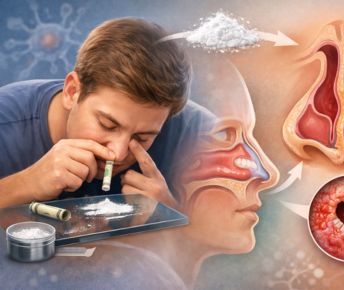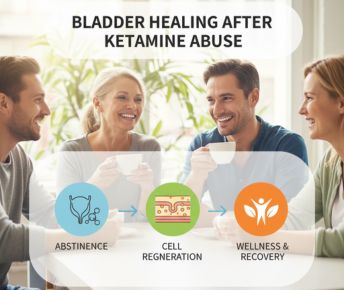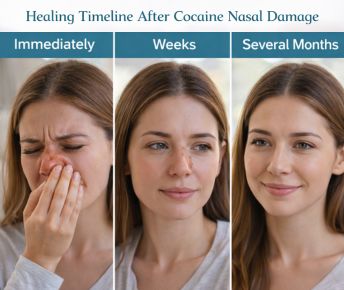Alcohol addiction is more than a personal struggle, it’s a public health challenge affecting millions worldwide. In India alone, a growing number of individuals grapple with the physical, emotional, and social consequences of excessive drinking. But what is alcoholism, really? Alcoholism isn’t just about drinking too much. It is more like a complex mix of genetics, environment, and mental health, often showing up in small, early signs long before full dependence sets in.
As awareness of treatment options grows, a new question is emerging: can AI therapy help in addressing alcoholism? Today, intelligent tools are doing more than just tracking habits. They can offer personalized guidance, detect early warning signs, and send timely prompts or interventions to support someone at risk of relapse. These technologies can extend the reach of traditional alcohol de-addiction centres, providing support outside clinic hours and complementing human care. While AI shows promise, it’s not a replacement for therapists or medical supervision. Rather, it works best as a companion in the recovery journey, helping individuals stay on track and make informed decisions about their health.
The Many Faces of Alcoholism: What You Need to Know
Alcoholism is far more than drinking excessively; it is a multifaceted condition influenced by genetics, mental health, social environment, and lifestyle. Its onset is often gradual, with alcoholism symptoms manifesting subtly, restless sleep, persistent fatigue, irritability, secretive behavior, or shifting moods, long before physical dependence becomes evident.
The experience varies widely: some individuals develop chronic, daily dependence, others engage in episodic binge drinking, while many maintain the appearance of normalcy despite struggling internally. Recognizing these differences is crucial, because the underlying causes of alcoholism, symptom patterns, and type of alcohol use directly shape which alcoholism treatments are likely to be effective.
Recovery often requires a combination of approaches, from structured programs at an alcohol de-addiction centre to tailored counseling and self-guided alcoholism self-care strategies. By addressing the physical, emotional, and behavioral dimensions of addiction, treatment can be personalized to reduce relapse risk and support lasting recovery, emphasizing that combating alcohol addiction is about healing the person, not just stopping drinking.
Also read: Best Alcohol Rehab Centre in Asia
Traditional Approaches to Alcohol Addiction Treatment
Understanding alcoholism is just the first step; the next is exploring how it can be treated. Over the years, conventional approaches have formed the backbone of recovery, combining medical, psychological, and social support to help individuals regain control over their lives. These methods remain essential, even as new technologies like AI begin to play a supportive role.
Common Alcohol De-Addiction Treatments
Treatment usually begins with detoxification, a medically supervised process to safely manage withdrawal symptoms. Detox is often accompanied by medications that reduce cravings or address co-occurring mental health issues.
Counseling and psychotherapy provide a space to unpack emotional triggers and develop healthier coping strategies, while peer support groups offer accountability, shared experience, and encouragement. Together, these interventions target both the physical and psychological aspects of alcohol addiction, laying a foundation for sustained recovery.
Role of an Alcohol De-Addiction Centre
Alcohol de-addiction centres provide a structured environment where individuals can focus entirely on recovery. Beyond offering medical supervision, these centres deliver a combination of individual therapy, group counseling, recreational and occupational therapy, and lifestyle coaching.
The controlled setting helps reduce exposure to triggers and reinforces positive behavioral patterns. For many, the centre becomes more than a treatment facility, it is a supportive community that nurtures consistency, accountability, and motivation, all critical in preventing relapse.
Strengths and Limitations of Conventional Methods
Traditional approaches are effective because they address the multifaceted nature of alcoholism, tackling both physical dependence and underlying emotional or psychological issues. However, they have limitations. Access to quality treatment can be constrained by geography, cost, or social stigma.
Even in structured programs, relapse rates can be high if support outside the centre is lacking. These challenges highlight the importance of complementary strategies, such as personalized self-care plans or digital interventions, that extend care beyond the clinic, providing ongoing support and real-time guidance for those navigating recovery in their everyday lives.
Where AI Steps in to Support Alcohol Addiction
While traditional care remains central to recovery, advances in AI therapy are opening new ways to support people struggling with alcohol addiction. AI-powered tools can analyze patterns in behavior, sleep, mood, and even communication to flag early risks of relapse—sometimes before the individual notices the warning signs themselves.
Chatbots and digital assistants, available around the clock, provide discreet guidance and coping strategies for alcoholism self-care, helping individuals manage cravings or stress outside the walls of a clinic.
More sophisticated applications are emerging too: predictive models can identify high-risk behaviors, while adaptive platforms can create personalized pathways for alcohol de-addiction treatment, adjusting recommendations based on progress and setbacks. Importantly, AI does not replace human therapists or the community found in an alcohol de-addiction centre; rather, it complements them by extending support, increasing accessibility, and making recovery tools more responsive to individual needs.
Benefits and Opportunities of AI in Alcoholism Treatment
The promise of AI therapy lies in its ability to extend care where traditional support may fall short. For individuals who cannot access an alcohol de-addiction centre because of cost, distance, or stigma, AI-powered apps and chatbots create an accessible entry point into recovery.
These tools are not generic; they can adapt to different types of alcoholism, drawing on user data to deliver personalized guidance, whether someone struggles with binge drinking, chronic dependence, or hidden, functional addiction.
Unlike scheduled therapy sessions, AI systems can offer real-time support, sending prompts during cravings, suggesting coping mechanisms when stress peaks, and reinforcing positive behaviors to reduce relapse risk. Beyond helping individuals, AI also equips clinicians with valuable insights by tracking progress, patterns, and triggers. This data-driven feedback loop allows therapists to refine alcoholism treatments, making them more precise and responsive to the unique journey of each patient.
Conclusion
The conversation around AI and alcoholism is less about replacing what exists and more about reimagining the ecosystem of recovery. The real opportunity lies in building bridges—between medical treatment and self-care, between structured programs and day-to-day life, between private struggles and accessible support.
AI offers a way to make those bridges stronger by filling the gaps where traditional care often struggles: continuity, personalization, and immediacy. But its impact will depend on how thoughtfully we integrate it.
For individuals, this means seeing AI not as a solution in itself but as a tool to stay engaged in the recovery process, a reminder that progress happens one choice at a time. For clinicians and alcohol de-addiction centres, it means using AI insights to better understand patients’ lived realities and adapt treatment accordingly.
And for society, it opens up the possibility of reducing stigma by framing alcoholism not as a moral failing but as a condition that can be tracked, managed, and treated with the same innovation we apply to other health challenges.
Ultimately, AI’s role in alcoholism treatment will be defined not by the sophistication of its algorithms but by the empathy and responsibility with which we deploy it. When paired with human care, AI can become more than a technological aid, it can be part of a cultural shift that sees recovery as accessible, continuous, and deeply human.
Frequently Asked Questions
1. Can AI help with alcoholism?
Yes, AI therapy can support people with alcohol addiction by tracking behavior, offering real-time self-care tips, and complementing traditional alcoholism treatments.
2. What is the most successful treatment for alcoholics?
The most effective alcoholism treatments combine detox, counseling, medication, and personalized care at an alcohol de-addiction centre.
3. What is the most popular program for recovering alcoholics?
The 12-step program, widely practiced in alcohol de-addiction centres, remains the most recognized path for recovery from alcohol addiction.
4. How best to help an alcoholic?
Support starts with compassion, encouraging professional alcohol de-addiction treatment, and helping them access resources tailored to their alcoholism symptoms and needs.
5. Can I get therapy from AI?
Yes, AI therapy tools and apps provide guidance and alcoholism self-care, but they work best when paired with human-led alcohol de-addiction treatment.
























 Yes, many offer serene environments and solid therapeutic frameworks. However, quality varies, so it’s essential to research accreditation, staff credentials, and therapeutic depth.
Yes, many offer serene environments and solid therapeutic frameworks. However, quality varies, so it’s essential to research accreditation, staff credentials, and therapeutic depth.




